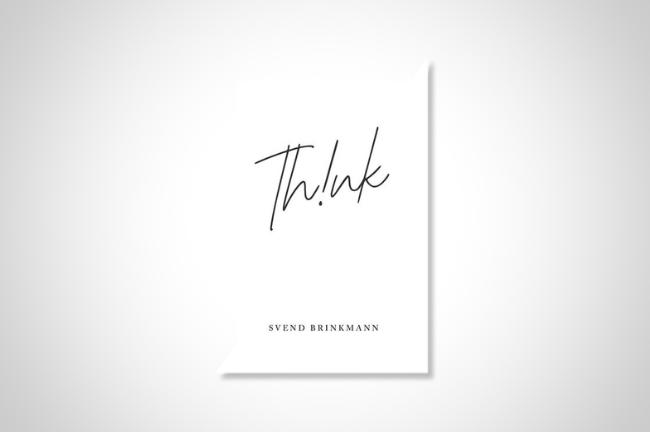You have /5 articles left.
Sign up for a free account or log in.

Polity
The Danish author Svend Brinkmann—a professor of psychology at Aalborg University—has to his credit a number of books translated into English, most from Polity, which chiefly publishes work in the social sciences and the theoretical side of the humanities. But Brinkmann’s more discipline-specific books (focused on qualitative research methodology, interviewing in particular) have come out from other presses, while his titles from Polity are meant for a broader public. It is tempting to call them self-help books, albeit of a sort intended for a faltering civilization rather than the individual reader with problems.
Not that the two are unconnected. In his latest volume, Think: In Defense of the Thoughtful Life (Polity), Brinkmann’s diagnosis is that massive chronic thoughtlessness has become a social and personal problem with dire implications:
“[T]he more technology simplifies things and improves efficiency, the more difficult it is to think,” the author says, “because thinking depends on the ability not to react in a knee-jerk manner, to postpone decisions, consult other people, listen to their experiences and arguments and consider the matter properly.”
An unmistakable note of superiority attaches to the judgment that whatever may go on in most people’s heads (the unspoken monologues, the privately screened memory-videos) doesn’t really count as thought. An author making such criticism risks coming off as a scold, or worse.
But in fact Brinkmann proves altogether genial company—something like a firm but encouraging life coach who has read Aristotle, among other masters of thought, and has some suggestions. He only wants what’s best for you, and for everyone, and his exhortations are implicitly directed, in part, at himself.
What is thought, then, in the author’s sense? Making no claim to work from scratch, Brinkmann readily adapts old ideas to present circumstances. One that becomes a cornerstone is the American philosopher John Dewey’s understanding of thought as the human organism’s response to changes confronting it, with unfamiliar circumstance requiring innovation, or a substantial departure from habits that have become second nature. If on-the-spot improvisation doesn’t solve the problem, a more prolonged effort at adjustment begins.
Dewey characterizes reflective thought as the “active, persistent and careful consideration of any belief or supposed form of knowledge in the light of the grounds that support it and the further conclusions to which it tends.” The definition applies to scientific thinking, and has it as a model, but also covers attempts to work out the enigmas of human experience and behavior. Literature, history and philosophy (even theology) would also exemplify Dewey’s notion of reflective thought.
From thought as having its origins in problem-solving, the author moves on to Aristotle’s understanding of thought as the defining capacity, the essential power, of the human animal. It is not just of instrumental use; it can be pursued as its own end. Brinkmann gives the example of looking at the night sky and contemplating its immensity, to no purpose outside the experience itself.
Human flourishing requires that thought be exercised and developed for its own sake. This might be construed as the philosopher’s professional self-interest speaking. But it throws down a challenge in any case. The human mind imposes an obligation to learn to use it. Faced with someone of at least average intelligence who insists that the earth is flat, Brinkmann writes, “many of us will probably feel” that a person who holds such a flatly wrong belief “isn't just wrong but has some kind of duty to wise up.” Everyone holds “a certain number of wrong beliefs,” he adds, “but if the virtues of thinking are sufficiently developed, we should be interested in forming truer thoughts and beliefs.”
Fostering thoughtfulness requires an emotional and educational process Brinkmann calls “formation.” He associates it with the German word Bildung—as per the literary genre of the Bildungsroman: a novel that traces an adolescent or young adult’s inner development. A point to stress is that formation does not mean self-improvement, which Brinkmann thinks has gotten out of hand as it is. (He refers to “the ubiquitous demand that we be flexible, innovative, active, agile, mobile, entrepreneurial, self-optimizing and engaged in lifelong learning.”) Rather, formation involves learning to listen to others; to imagine their experiences and beliefs, and so gain some distance from what is already familiar to you; to recognize confirmation bias in yourself, or at least keep an eye out for it.
Brinkmann also quotes one of America’s most incisive cultural commentators, Fran Lebowitz, on another element of formation: “Think before you speak, read before you think.” Besides being wise counsel, the motto aligns with one of the book’s recurrent themes: the link between thought and slowing down, letting an impression or insight have the time needed to take shape. Otherwise, our minds are “trapped in the present,” he writes, which “reduces thinking to what is expedient in the moment, and it ultimately places us at the mercy of our random impulses.”
That is a familiar critique of the contemporary attention span, but I wonder if other considerations also apply. Our period does not only prevent or undermine thought. There are problems that (Dewey notwithstanding) elicit no thought because they are staggering in scale and unbearable to consider for very long. I won’t itemize; you probably have your own list. Cultivating curiosity and perspective are crucial for human formation, but Think perhaps underestimates the role of courage.








